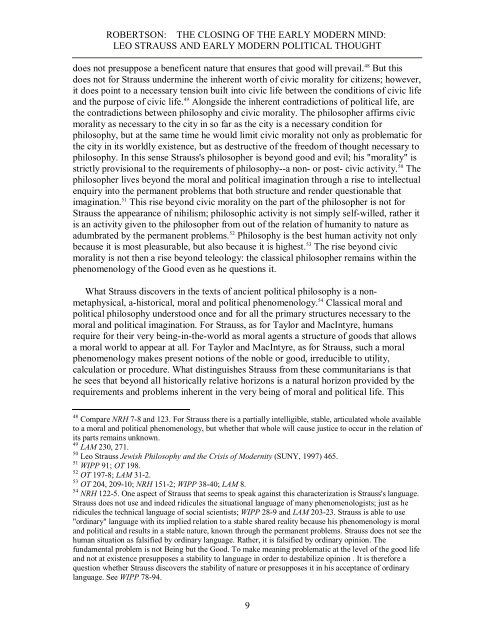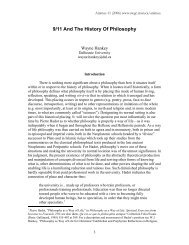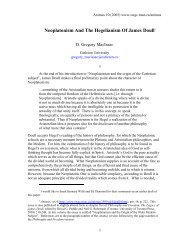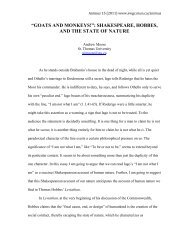Leo Strauss And Early Modern Political Thought
Leo Strauss And Early Modern Political Thought
Leo Strauss And Early Modern Political Thought
You also want an ePaper? Increase the reach of your titles
YUMPU automatically turns print PDFs into web optimized ePapers that Google loves.
ROBERTSON: THE CLOSING OF THE EARLY MODERN MIND:LEO STRAUSS AND EARLY MODERN POLITICAL THOUGHTdoes not presuppose a beneficent nature that ensures that good will prevail. 48 But thisdoes not for <strong>Strauss</strong> undermine the inherent worth of civic morality for citizens; however,it does point to a necessary tension built into civic life between the conditions of civic lifeand the purpose of civic life. 49 Alongside the inherent contradictions of political life, arethe contradictions between philosophy and civic morality. The philosopher affirms civicmorality as necessary to the city in so far as the city is a necessary condition forphilosophy, but at the same time he would limit civic morality not only as problematic forthe city in its worldly existence, but as destructive of the freedom of thought necessary tophilosophy. In this sense <strong>Strauss</strong>'s philosopher is beyond good and evil; his "morality" isstrictly provisional to the requirements of philosophy--a non- or post- civic activity. 50 Thephilosopher lives beyond the moral and political imagination through a rise to intellectualenquiry into the permanent problems that both structure and render questionable thatimagination. 51 This rise beyond civic morality on the part of the philosopher is not for<strong>Strauss</strong> the appearance of nihilism; philosophic activity is not simply self-willed, rather itis an activity given to the philosopher from out of the relation of humanity to nature asadumbrated by the permanent problems. 52 Philosophy is the best human activity not onlybecause it is most pleasurable, but also because it is highest. 53 The rise beyond civicmorality is not then a rise beyond teleology: the classical philosopher remains within thephenomenology of the Good even as he questions it.What <strong>Strauss</strong> discovers in the texts of ancient political philosophy is a nonmetaphysical,a-historical, moral and political phenomenology. 54 Classical moral andpolitical philosophy understood once and for all the primary structures necessary to themoral and political imagination. For <strong>Strauss</strong>, as for Taylor and MacIntyre, humansrequire for their very being-in-the-world as moral agents a structure of goods that allowsa moral world to appear at all. For Taylor and MacIntyre, as for <strong>Strauss</strong>, such a moralphenomenology makes present notions of the noble or good, irreducible to utility,calculation or procedure. What distinguishes <strong>Strauss</strong> from these communitarians is thathe sees that beyond all historically relative horizons is a natural horizon provided by therequirements and problems inherent in the very being of moral and political life. This48 Compare NRH 7-8 and 123. For <strong>Strauss</strong> there is a partially intelligible, stable, articulated whole availableto a moral and political phenomenology, but whether that whole will cause justice to occur in the relation ofits parts remains unknown.49 LAM 230, 271.50 <strong>Leo</strong> <strong>Strauss</strong> Jewish Philosophy and the Crisis of <strong>Modern</strong>ity (SUNY, 1997) 465.51 WIPP 91; OT 198.52 OT 197-8; LAM 31-2.53 OT 204, 209-10; NRH 151-2; WIPP 38-40; LAM 8.54 NRH 122-5. One aspect of <strong>Strauss</strong> that seems to speak against this characterization is <strong>Strauss</strong>'s language.<strong>Strauss</strong> does not use and indeed ridicules the situational language of many phenomenologists; just as heridicules the technical language of social scientists; WIPP 28-9 and LAM 203-23. <strong>Strauss</strong> is able to use"ordinary" language with its implied relation to a stable shared reality because his phenomenology is moraland political and results in a stable nature, known through the permanent problems. <strong>Strauss</strong> does not see thehuman situation as falsified by ordinary language. Rather, it is falsified by ordinary opinion. Thefundamental problem is not Being but the Good. To make meaning problematic at the level of the good lifeand not at existence presupposes a stability to language in order to destabilize opinion . It is therefore aquestion whether <strong>Strauss</strong> discovers the stability of nature or presupposes it in his acceptance of ordinarylanguage. See WIPP 78-94.9
















